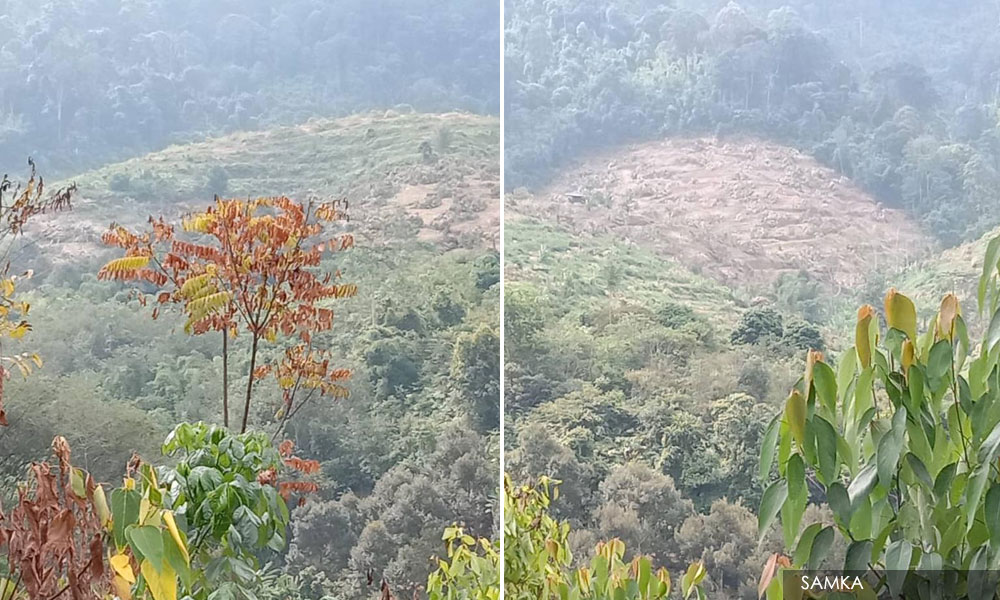LETTER | What’s next after the enforcement at Batu Talam Forest Reserve?
I applaud the Pahang Forestry Department for the recent enforcement operation against illegal plantations at the Batu Talam Permanent Forest Reserve, Raub. The illegal durian farm fiasco and uproar have certainly brought to light a few points. The most obvious one is whether the issue of encroachment is new or has it been perpetuated through the decades?
Illegal farming has been happening for many years and a study was done in 2002 to highlight the dangers of encroachment.
Since the authorities know about the dangers, why isn’t the state government implementing a more sustainable and planned enforcement instead of an impromptu operation? Enforcement efforts should be stepped up while providing illegal farmers a sustainable livelihood by guiding them on good agricultural practices instead of just leaving them in the dark after the trees are chopped down.
Way back in early 2002, I remember a study on the Sustainable Development of the Highlands of Peninsular Malaysia. It was conducted by the World Wide Fund for Nature with the Prime Minister Office under the Economic Planning Unit (EPU) and supported by the United Nation’s Development Programme (UNDP), highlighting the issue of forest reserve encroachment in the Gunung Benum Forest Reserve in Raub, Pahang.
According to the study, Benum Range, which is located in central Pahang between Jerantut, Raub and Temerloh, hosts one of the largest wildlife reserves in Peninsular Malaysia, known as the Krau Wildlife Reserve. One of the Permanent Forest Reserves, Gunung Benum is located within the Benum Range.
The study highlighted that the farmers from Raub encroached into the Gunung Benum Forest Reserve, which was reported as "the encroachment is fairly extensive at 7,000 acres”, covering both state and forest reserve. Almost two-thirds of the encroachment was within the forest reserve and was cleared for commercial crops. This is the same district that recently saw 15,000 durian trees chopped for being planted illegally in the forest reserve.
Today, I am appalled by the way two local vocal politicians in Raub are playing up the issue for the public. One of the politicians mentioned that there are 11,000-acre illegal durian encroachments in Raub, which certainly has some credence. Another politician also alluded in a recent video interview that up to a whopping 70 percent of durians produced by Raub comes from these illegal farms.
Based on statistics by the Agriculture Department, Raub alone produced 71,000 tons of durians in 2019 of which 70 percent of it represents 49,700 tons per year. Assuming a production of 3.5 tons per acre every year, does this mean that the scale of encroachment in Raub has reached upwards of 14,000 acres?
This reflects a 100 percent increase! In comparison, we are talking about 8,000 football fields here. Apart from the sheer magnitude of encroachment, the illegality, the size of the nature of the industry coupled with the propensity for corruption - this is equally frightening. With the current demand from China market that is close to 700,000 tons annually and Malaysia’s export being only at 30,000 tons as reported, can we imagine the extent of illegal encroachment in the next five years if this issue is left unchecked?
Despite this, both local politicians are painting a picture that the farmers are being “victims”, “poor” and “circumstantial”. Let’s put things in perspective. One acre of production at 3.5 tons per acre multiplied by an average farm price of RM30/kg, we are looking at an annual revenue figure of RM1.5 billion for 14,000 acres of encroachment or, as one would say, a lucrative “off-the-record cash (from an) underground economy”.
If each farmer were to toil on a 10-acre illegal durian farm, they will be enjoying an income of RM1,050,000 annually. Hardworking yes, but poor? Absolutely not! And what about the legal farmers who have done everything right, played by the books and paid their taxes and local cukai tanah? Isn’t this unfair to these legal farmers too? Perhaps, the Inland Revenue Board should further investigate this matter.

It’s shameful to see politicians constantly play with rhetoric and sentiments. We heard not too long ago a politician suggest that no one should escape the claws of the Inland Revenue Board and that "law is the law” approach must be used when dealing with the business community. Why aren’t his political underlings singing the same slogan in Raub now? It seems like when they are not in government, they sing a different tune and are just as happy to play the race card where convenient. I am beyond dismay!
I hope the recent enforcement by the Pahang government in evicting the illegal farmers in Batu Talam Forest Reserve is not just a public relations stunt. How about the remaining 11,000-14,000 acres of illegal encroachment? What is the state government's next course of action?
While taking firm action is necessary in addressing illegal encroachments, we must also put into perspective the livelihood of Malaysia’s economy especially during these times. Durians are now one of the country’s top potential sources of export revenue. Unless there is a holistic solution to such a complex problem, the Pahang government must have the will to see through it to the very end and not pay lip service with the “occasional” enforcement here and there.
I hope the state will resolve this thorny issue.
The views expressed here are those of the author/contributor and do not necessarily represent the views of Malaysiakini.

